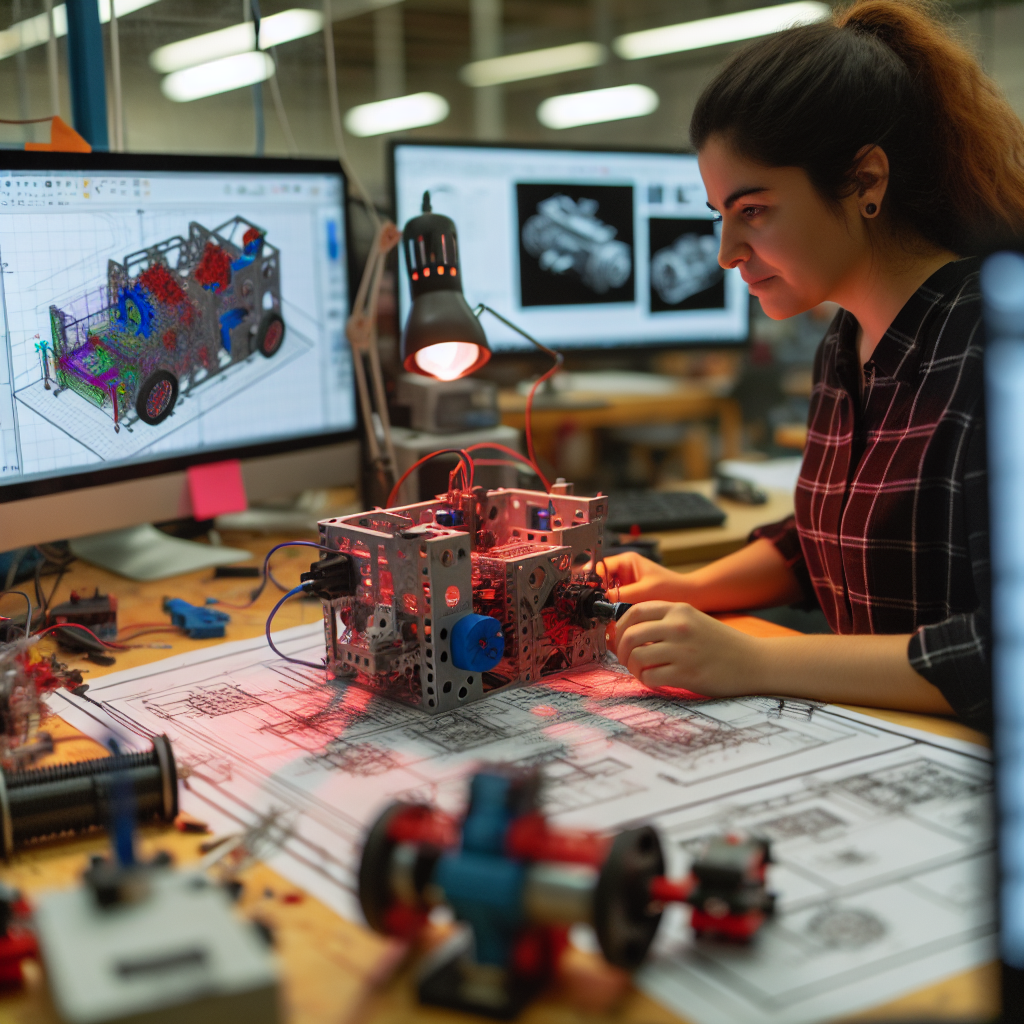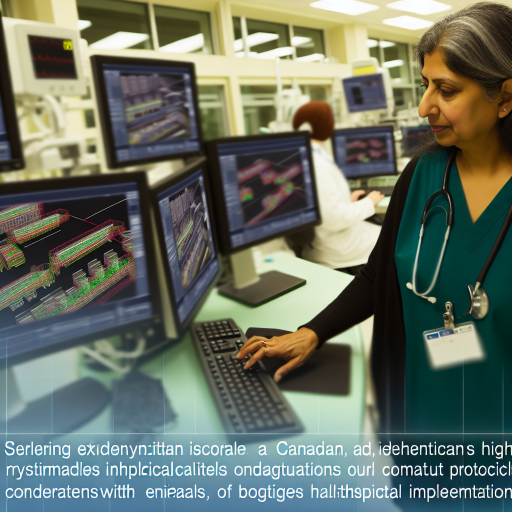Overview of Mechatronics Engineering
Definition
Mechatronics engineering combines mechanical, electrical, and computer engineering.
This multidisciplinary field focuses on the design and control of intelligent systems.
It integrates hardware and software to create automated equipment.
Importance of Mechatronics Engineering
Mechatronics is crucial in modern manufacturing processes.
It enhances product quality and production efficiency.
Furthermore, it enables the development of advanced robotics.
These robots can perform tasks in various industries.
Applications of Mechatronics
Mechatronics plays a significant role in several sectors.
- Automotive industry relies on automation for safety systems.
- Aerospace engineering uses mechatronics for avionics.
- Medical devices incorporate mechatronics for precision.
Future Trends
The field of mechatronics continues to evolve rapidly.
Emerging technologies like AI and IoT shape its future.
These innovations will lead to smarter and more efficient systems.
Consequently, demand for skilled mechatronics engineers will grow.
Educational Requirements
Degrees Required for Mechatronics Engineering
Prospective mechatronics engineers often pursue a bachelor’s degree in mechatronics engineering.
Many universities in Canada offer specialized programs focused on this interdisciplinary field.
Essentially, a degree combines mechanical, electrical, and computer engineering principles.
This foundation equips graduates with the skills necessary for designing and managing complex systems.
Advanced Education Opportunities
Some individuals may choose to continue their education after earning a bachelor’s degree.
Master’s degrees in mechatronics or related fields can enhance career prospects significantly.
These programs often include research components, fostering deeper technical expertise.
Furthermore, doctoral programs are available for those interested in academia or advanced research roles.
Certifications and Licenses
In addition to degrees, certifications can bolster a resume in mechatronics engineering.
Organizations such as the Association of Professional Engineers and Geoscientists of Alberta offer certification programs.
Obtaining Professional Engineer (P.Eng) status is often beneficial for career advancement.
This licensure typically requires several years of work experience as well.
Continuing Education and Skills Development
Mechatronics engineers should consider ongoing education to stay current in the field.
Unlock Your Career Potential
Visualize a clear path to success with our tailored Career Consulting service. Personalized insights in just 1-3 days.
Get StartedWorkshops, webinars, and certifications in emerging technologies can enhance skills effectively.
Networking opportunities at industry conferences can also foster professional growth.
Companies often provide training programs that help employees advance in specialized areas.
Transferable Skills
Mechatronics engineering encompasses various skills valuable across multiple industries.
Critical thinking and problem-solving are essential components of the role.
Additionally, strong communication skills support collaboration within interdisciplinary teams.
Technological proficiency is increasingly important, given the reliance on automation and robotics.
Core Skills and Competencies
Technical Skills
Mechatronics engineers must possess a deep understanding of mechanics.
They should be proficient in electronics and automation technologies.
Knowledge of control systems and robotics is essential for their tasks.
Engineers need to be skilled in computer-aided design (CAD) software.
Additionally, familiarity with programming languages enhances their capabilities.
Proficiency in data analysis and simulation tools is crucial.
Understanding manufacturing processes helps in designing efficient systems.
Finally, practical experience with sensors and actuators is beneficial.
Soft Skills
Effective communication is vital for collaboration with diverse teams.
Problem-solving skills help engineers address technical challenges effectively.
Strong analytical thinking enables them to interpret complex data.
Creativity fosters innovation in designing new systems and components.
Time management skills ensure projects are completed within deadlines.
Leadership abilities can help engineers lead teams and projects successfully.
Adaptability is important in a fast-evolving technological landscape.
Building a Strong Foundation
Obtaining a degree in mechatronics or a related field is the first step.
Gaining practical experience through internships is highly beneficial.
Networking with industry professionals opens doors to opportunities.
Participating in workshops and conferences enhances knowledge and skills.
Continual learning keeps engineers updated on emerging technologies.
Seeking mentorship from experienced professionals can provide valuable insights.
Discover More: Role of Petroleum Engineers in Sustainable Energy
Career Opportunities
Industries Employing Mechatronics Engineers
Mechatronics engineers find opportunities across various industries.
The manufacturing sector is a major employer.
Robotics and automation companies seek skilled mechatronics engineers.
These professionals also have roles in automotive engineering.
Aerospace firms utilize their expertise for advanced systems.
Additionally, the medical device industry relies heavily on mechatronics skills.
Consumer electronics manufacturers value their ability to integrate technologies.
Furthermore, the renewable energy sector offers promising career paths.
Construction and building automation industries are also hiring.
Key Sectors for Employment
Some key sectors include robotics, automation, and control systems.
Manufacturing and production facilities constantly require mechatronics engineers.
Telecommunications companies employ professionals for system integration.
In addition, research and development firms seek innovative engineers.
Mechatronics engineers also engage in software development for devices.
Emerging Opportunities
The demand for mechatronics engineers is growing in Canada.
New sectors are emerging, such as the Internet of Things (IoT).
Smart systems in everyday applications create numerous job openings.
Moreover, advancements in artificial intelligence and machine learning enable innovation.
Mechatronics engineers can also contribute to smart city projects.
Gain More Insights: Career Growth Opportunities for Mechatronics Engineers
Job Market Trends in Canada
Demand for Mechatronics Engineers
Mechatronics engineering remains a rapidly growing field in Canada.
Industries increasingly rely on automation and smart systems.
As a result, the demand for qualified mechatronics engineers continues to rise.
Large firms like Bombardier and Siemens are expanding their engineering teams.
Furthermore, startups in robotics are emerging across the country.
These companies require expertise in mechatronics to innovate their products.
In addition, traditional industries are seeking automation solutions.
This shift creates various opportunities for new graduates and experienced professionals.
Future Outlook for Mechatronics Professionals
The future looks promising for mechatronics engineers in Canada.
Technological advancements indicate sustained job growth in this sector.
Emerging fields like artificial intelligence and machine learning enhance the outlook.
As industries integrate these technologies, demand will grow even further.
Moreover, educational institutions are adapting their programs to meet industry needs.
They emphasize practical experience through internships and co-op programs.
Consequently, graduates will have strong skills and experience when entering the workforce.
The shift towards sustainable technologies also presents new opportunities.
Mechatronics engineers can contribute significantly to green technology initiatives.
Overall, the career path in mechatronics engineering is bright in Canada.
Uncover the Details: Key Skills Needed to Succeed as a Chemical Engineer

Professional Development
Importance of Continuous Learning
Continuous learning is vital in the fast-evolving field of mechatronics engineering.
New technologies and methodologies emerge regularly.
Professionals must adapt to stay relevant in the industry.
Engaging in ongoing education enhances career prospects.
Certifications
Certifications bolster your qualifications and expertise.
Many organizations offer specialized certifications for mechatronics engineers.
Examples include the Certified Automation Professional (CAP) and the Certified Manufacturing Engineer (CMfgE).
These credentials demonstrate your skills in automation and manufacturing technologies.
They can significantly improve job performance and marketability.
Workshops and Seminars
Participating in workshops provides hands-on experience.
These sessions often cover emerging technologies and practical applications.
Local engineering associations host regular seminars on various topics.
Attending such events allows networking with industry professionals.
Additionally, you gain insights from experienced speakers.
Online Learning Platforms
Online platforms offer flexible learning opportunities.
Websites like Coursera and edX provide courses in mechatronics and robotics.
Courses are often developed by renowned universities and industry experts.
Self-paced learning allows you to balance work and education effectively.
Staying Informed on Industry Trends
Staying updated on industry trends is crucial for your growth.
Subscribe to industry journals and follow relevant blogs.
Participating in forums and online communities can also be beneficial.
These resources keep you informed about the latest advancements.
Networking Opportunities
Networking is essential for professional growth and opportunity discovery.
Engage with peers and industry leaders through various platforms.
Attend conferences and trade shows related to mechatronics.
These events facilitate connections and collaborations.
Moreover, they can lead to job opportunities and mentorship.
Gain More Insights: Career Pathways in Aerospace Engineering
Networking and Professional Associations
The Importance of Connections in the Mechatronics Field
Networking plays a critical role in the mechatronics engineering field.
Building professional relationships can greatly enhance career opportunities.
Moreover, connections help engineers stay informed about industry trends.
Attending conferences is an excellent way to network with peers and experts.
Through these events, engineers gain valuable insights and foster collaborations.
In addition, joining professional associations can be highly beneficial.
Organizations like the Canadian Society of Mechanical Engineers offer resources.
They provide access to training, scholarships, and professional development workshops.
Also, these associations often host local networking events.
These gatherings create a platform for sharing ideas and experiences.
Establishing Relationships with Industry Professionals
Building relationships starts with effective communication skills.
Engineers should practice active listening to understand others.
Furthermore, showing genuine interest in their work can strengthen connections.
LinkedIn is a powerful tool for professional networking.
Creating a strong profile allows engineers to showcase their skills.
Engaging with content related to mechatronics can attract attention.
Moreover, dedicated participation in discussions can open new doors.
Benefits of Joining Professional Organizations
Membership in professional organizations offers many advantages.
Members often receive exclusive access to research publications and reports.
This information can inform their projects and enhance knowledge.
Additionally, organizations usually offer mentorship programs.
These programs connect less experienced engineers with seasoned professionals.
This guidance can significantly impact career development.
Networking within these organizations helps in finding job opportunities.
Employers often recruit from known associations to find qualified candidates.
Staying Engaged and Involved
Active participation is vital for getting the most from associations.
Volunteering for committees or organizing events showcases commitment.
Such involvement can lead to leadership opportunities in the future.
Furthermore, staying updated on industry standards is crucial.
Professional associations often provide continuing education programs.
These programs help engineers remain competitive in the field.
Networking and professional associations are invaluable.
They enhance career prospects and foster growth in mechatronics engineering.
Salary Expectations
Average Salaries in Mechatronics Engineering
The average salary for mechatronics engineers in Canada is competitive.
According to recent statistics, entry-level positions start around $60,000 per year.
Experienced professionals can earn upwards of $90,000 annually.
In cities like Toronto and Vancouver, salaries tend to be higher.
Conversely, smaller towns may offer lower wages.
Factors Influencing Earnings
Several factors affect salary levels in mechatronics engineering.
Firstly, education plays a crucial role in determining earning potential.
Higher degrees typically lead to better job prospects.
Secondly, years of experience significantly influence salaries.
Professionals with extensive experience often command higher wages.
Industry Demand
Industry demand also impacts salary levels for mechatronics engineers.
Fields like robotics and automation are seeing rapid growth.
This demand often leads to increased compensation packages.
Company Size and Location
The size and location of the company affect salary as well.
Large corporations often offer higher salaries and better benefits.
Geographical location can also create salary disparities.
For example, urban areas typically provide more financial opportunities.
Job Roles and Responsibilities
The specific job roles within mechatronics can impact earnings.
Positions like project managers usually receive higher salaries.
Alternatively, entry-level engineers may earn less due to less responsibility.
Moreover, specialized roles in research or development often come with premium pay.
Certifications and Additional Skills
Certifications can enhance earning potential in this field.
For instance, certifications in automation technologies are highly valued.
Furthermore, additional skills in software development can increase job prospects.
Staying updated with technological advancements can also lead to better salaries.
Additional Resources
Study in Artificial Intelligence in Canada
Dr. Ahmad Barari, PhD | Faculty of Engineering and Applied Science




